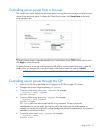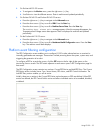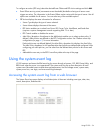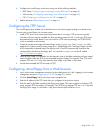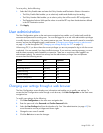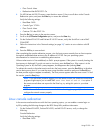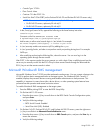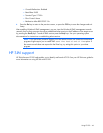
Using LO100 39
2.
Configure the virtual floppy on the server using one of the following methods:
o BIOS Setup ("Configuring the virtual floppy from the BIOS setup" on page 40)
o Web browser ("Configuring virtual floppy from a Web browser" on page 39)
o CLP ("Configuring virtual floppy from the CLP" on page 40)
3. Reboot the server ("Rebooting the server" on page 41).
Configuring the TFTP Server
The virtual floppy feature enables you to boot the server with a boot image residing on a remote server.
To boot using a virtual floppy on a remote system:
1. Install a TFTP server on a remote system and ensure that it is running. (TFTP servers are typically
included with Linux and are available for other operating systems as well. Consult your TFTP server
documentation for further details. If you do not have a TFTP software package, use TFTPD32.EXE,
which is available on the Internet.)
2. Create the remote boot image of the boot floppy using flimage.exe. The flimage.exe utility
application is used to create a binary image of a 1.44-MB floppy disk. The floppy image is stored
as 80 sequentially-numbered binary files starting with 0. Each file represents the contents of the
corresponding cylinder from the floppy disk. You can find flimage.exe on the HP website
(http://www.hp.com/support
).
3. Place the boot image in a subfolder (for this example, rboot is the folder containing the boot image)
under the folder where the TFTP server executable program resides. For example, if the TFTP server
program TFTP.exe is in C:\tftp, then place the boot image in the folder c:\tftp\rboot.
4. Launch the executable file TFTP.exe and run TFTP.
Configuring virtual floppy from a Web browser
1. Log in to the remote management processor as described previously in the "Logging in to the remote
management processor ("Logging in to LO100" on page 28)" section.
2. Click the Virtual Floppy link from the main menu navigation bar.
3. Enter the IP address of the TFTP server that you configured in the previous section.
4. Enter the path to the folder containing the floppy boot image. This path is relative to where the TFTP
server program TFTP.exe resides. For example, if the TFTP server program TFTP.exe is in C:\tftp and
the floppy boot image is in the folder c:\tftp\rboot, then the path would be rboot.



